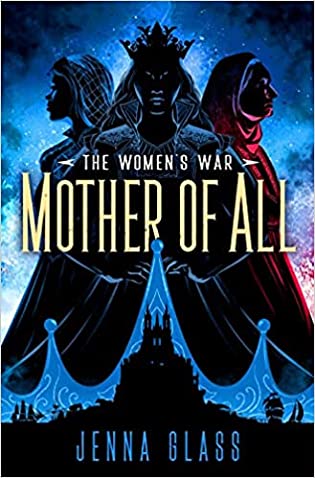 Mother of All (Women's War, #3) by Jenna Glass
Mother of All (Women's War, #3) by Jenna Glass Format: audiobook, eARC
Source: purchased from Audible, supplied by publisher via NetGalley
Formats available: paperback, ebook, audiobook
Genres: epic fantasy, fantasy
Series: Women's War #3
Pages: 656
Published by Del Rey on July 20, 2021
Purchasing Info: Author's Website, Publisher's Website, Amazon, Barnes & Noble, Kobo, Bookshop.org
Goodreads
An evil new magic threatens to undo all the progress women have made in the third and final book in Jenna Glass's riveting feminist fantasy, following The Women's War and Queen of the Unwanted.
In the once male-dominated world of Seven Wells, women now control their own reproduction, but the battle for equality is far from over. Even with two thrones held by women, there are still those who cling to the old ways and are determined to return the world to the way it was.
Now into this struggle comes a darker power. Delnamal, the former King of Aalwell, may have lost his battle to undo the spell that gave women reproductive control, but he has gained a terrible and deadly magic, and he uses these new abilities to raise an army the likes of which the world has never seen. Delnamal and his allies seem like an unstoppable force, destined to crush the fragile new balance between men and women.
Yet sometimes it is possible for determined individuals to stem the tide, and it comes down to a unique triad of women--maiden, mother, and crone--to risk everything...not only to preserve the advances they have won but to change the world one final time.
My Review:
Three “things”, three truths, lie underneath the entire Women’s War trilogy. One is the old saying about power corrupting and absolute power corrupting absolutely. This is a world where men have absolute power over women, a power so absolute that it has corrupted the entire society. A power that is used so callously and so heinously that it takes three generations of planning and sacrifice for a trio of desperate women to make the ultimate sacrifice in order to even make a dent in the absolute supremacy of male power.
The second truth is a much more recent saying, the one about man making “God” in his own image. The entire myth of the “Creator”, his “Mother” and the “Destroyer” that squats at the heart of the religion of Seven Wells is certainly a deity made in the image of men. Not humankind, just men. They use their state-entwined religion to explain and excuse the systemic abuse of women at every turn.
It is, however, equally true that if man makes his god in his own image, so does woman. Which is where the title of this entry in the series derives its meaning.
And last, but not least, something that is not so succinctly phrased as the above two concepts, but feels like a truth for this series, is that when a society yokes political power and religious authority, all they are really doing is greasing the skids down the road to hell.
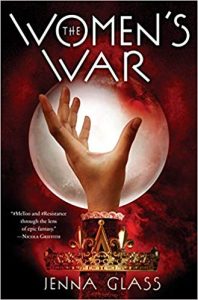 The story of Women’s War is a single story spread over three not insubstantial parts, meaning that it begins in the first book, The Women’s War, continues in Queen of the Unwanted, and concludes here in Mother of All. This is very much NOT three books that each stands alone, but one long and complex story that must be begun at the beginning in order for the ending to have the weight and heft and gravitas that it deserves.
The story of Women’s War is a single story spread over three not insubstantial parts, meaning that it begins in the first book, The Women’s War, continues in Queen of the Unwanted, and concludes here in Mother of All. This is very much NOT three books that each stands alone, but one long and complex story that must be begun at the beginning in order for the ending to have the weight and heft and gravitas that it deserves.
Because it most definitely does deserve all those things. And I say all of the above in spite of the fact that, as much as I enjoyed both the first book, The Women’s War, and this one, that middle book drove me right straight up the wall. But what happened there is necessary in order to understand how all the characters and this world reach the events of this final book in the trilogy.
As this final chapter opens, the chess pieces are all on the board, but not necessarily in the places we expect. Sovereign Princess Alysoon of Women’s Well begins the story believing that the situation in Seven Wells might get better, albeit as slowly as the reactionaries in most other countries can arrange. Her friend, Sovereign Queen Ellinsoltah, is on the throne of neighboring Rhozinolm, and Ellin’s Prince Consort Zarsha is one of the very few men in this story who is not an absolute ass. Not that he’s perfect, because he’s far from that, but he is on the side of change and is eager to help both Ellin and Alys effect that change.
That he is also Ellin’s spymaster makes him an extremely useful player on their side.
Aaltah, Alys’ birthplace, is now in the hands of her brother Tynthanal as Prince Regent. Their hated half brother Delnamal, the previous king, is believed to be dead as the result of an accident or incident or catastrophe or all of the above at the site of Aaltah’s Well, the source of the kingdom’s magical power. Whatever happened to the former king, a catastrophe certainly happened both at and to the Well, a catastrophe that Tynthanal is expected to fix.
A catastrophe that has impacted Aaltah’s magic, its ability to create the magical items that fuel its import/export trade agreements and therefore its economy. A catastrophe that appears to have had even more dire consequences that are just beginning to make themselves known. And unfortunately for pretty much everyone, reports of Delnamal’s death turn out to be, not exactly greatly exaggerated, but terrifyingly incorrect in those all-important pesky details where the devil, or in this case the Destroyer, is considered to reside.
But the situation in Seven Wells is much more precarious than first appears. It must be or there wouldn’t be an entire book yet to come. This world, and the gains that women have made in it, are not yet safe. It will require another trio of women to make another potentially grave sacrifice in order for this place to have a future. Not just a future where everyone can thrive, but any future at all.
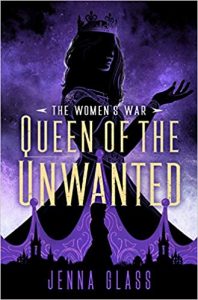 Escape Rating A: Short summary of the series – loved the first book, wasn’t all that thrilled with the second but it was necessary, loved the third book. This book. Mother of All brought this epic trilogy to an appropriately epic conclusion, and it made wading through all the setup and political positioning and maneuvering in the second book worth the wade. Also worth the wait of anticipating this conclusion.
Escape Rating A: Short summary of the series – loved the first book, wasn’t all that thrilled with the second but it was necessary, loved the third book. This book. Mother of All brought this epic trilogy to an appropriately epic conclusion, and it made wading through all the setup and political positioning and maneuvering in the second book worth the wade. Also worth the wait of anticipating this conclusion.
Seriously, I planned to listen to this one, but switched to the much faster ebook at barely the halfway point because I was so caught up in this and needed to find out how they collectively got out of the many, many catastrophes that were heading in their direction with all the speed of a juggernaut careening down the side of a mountain.
One of the things that is true throughout this series, that the reader is kind of bludgeoned with at the very beginning, is that this world is seriously messed up, totally FUBAR’d beyond not just recognition but beyond all reason, and that the overall arc of the series is the one-step-forward and sometimes ten-steps-back need to, well, unfuck the whole thing. Especially as it seems as if 90% of the men would rather life went back to the way things were when they could rape and murder women at will without repercussions of any kind. (There are fantasy worlds I might be interested in living in, like Pern and Celta. I wouldn’t touch Seven Wells with someone else’s severed hand.)
It’s not just that women have not just few but absolutely ZERO rights and are not just considered property but are legally chattel to either their fathers or their husbands is just the tip of the rotten iceberg. It’s honestly much worse than that. But, and a huge but, as much as some readers may want to see that as a situation for epic fantasy without application to the real world, I believe that there are and were plenty of patriarchal societies, past and present, in the real world that may not have been quite as awful for women but only missed this level of horror by a hair’s breadth.
All of the above makes this series not exactly a comfort or even a comfortable read, no matter how much one might love epic fantasy. Rather it makes for a searing and emotional read, as the reader is taken on an emotional roller coaster ride with characters who seem all too real in their hopes, their challenges, and the danger they face just for being women in a society that believes they are barely human and punishes them harshly if they attempt to assert even a minimal level of control over their own lives.
And that’s what makes this story, in spite of its frequent walks through very dark places, such a compelling read. It’s the characters. It’s walking by their sides and hoping with them against all hope that they might have made just enough of a difference in their world that their daughters will have a better future than their mothers.
Reviewer’s Note: If you’ve ever played Dragon Age Inquisition, Delnamal is kind of a dead ringer for Corypheus, all puns intended, although Delnamal manages to come to a much better end.

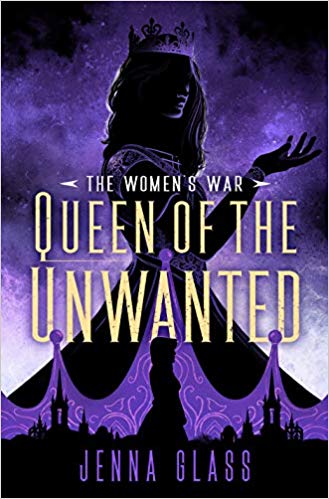 Queen of the Unwanted by
Queen of the Unwanted by  Or at least, not until the very end, when the action suddenly proceeds apace, only to leave readers with multiple terrible book hangovers as they wait for the next book. Whenever it appears. I listened to 80% of this and then read the rest. The audio was interesting enough to keep me occupied while driving, but when things picked up I couldn’t stand to continue at that slow pace.
Or at least, not until the very end, when the action suddenly proceeds apace, only to leave readers with multiple terrible book hangovers as they wait for the next book. Whenever it appears. I listened to 80% of this and then read the rest. The audio was interesting enough to keep me occupied while driving, but when things picked up I couldn’t stand to continue at that slow pace.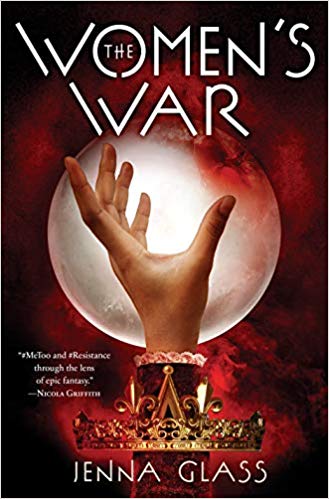 The Women's War (Women's War, #1) by
The Women's War (Women's War, #1) by 